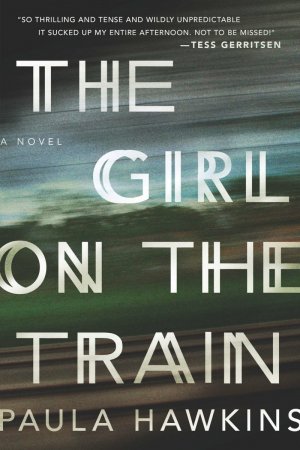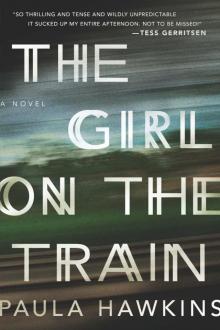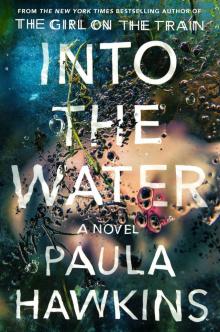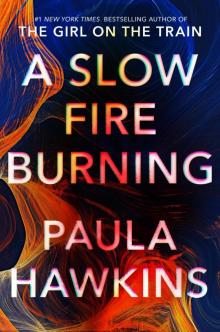- Home
- Paula Hawkins
Into the Water Page 10
Into the Water Read online
Page 10
“Which man, Jules? Who are you talking about?”
My tongue was tied in reeds and my mouth was full of mud. I wanted to tell her, I wanted to say, I remember him. I know what he’s capable of.
“Who did you see?” she asked me.
“Robbie.” I said his name at last. “Robbie Cannon.”
August 1993
JULES
I’d forgotten. Before the football game, something else happened. I was sitting on my towel, reading my book, no one else yet around, and then you came. You and Robbie. You didn’t see me under the trees, you ran into the water with him after you, and you swam and splashed and kissed. He took your hand and pulled you to the water’s edge, he lay on top of you, pushed your shoulders down, arched his back and looked up. And saw me, watching. And smiled.
Later that afternoon, I returned to the house alone. I took off the gingham bathing suit and the blue shorts and left them soaking in cold water in the sink. I ran myself a bath and climbed in and sank down and thought, I will never be rid of it, all this awful flesh.
A big girl. A bruiser. Legs to kick-start a 747. She could play front row for England.
Too big for the spaces I inhabited, always overflowing. I took up too much room. I sank down into the bath and the water rose. Eureka.
Back in my room, I climbed under the bedcovers and lay there, suffocating with misery, self-pity mingled with guilt, because my mother lay in bed in the very next room and she was dying of breast cancer and all I could think about was how much I didn’t want to go on, didn’t want to live like this.
I fell asleep.
My father woke me. He had to take my mother to the hospital for more tests the next morning, and they were going to stay the night in town because it would be an early start. There was some supper in the oven, he said, I was to help myself.
Nel was at home, I knew, because I could hear her music in the room next door. After a while, the music stopped, and then I could hear voices, low and then louder, and other noises, too, moaning, grunting, a sharp intake of breath. I got out of bed, got dressed and went out into the corridor. The light was on, the door to Nel’s room slightly ajar. It was darker in there, but I could hear her, she was saying something, she was saying his name.
Barely daring to breathe, I took a step closer. Through the crack in the door I could make out their shapes moving in the darkness. I couldn’t bring myself to look away; I watched until I heard him make a loud animal noise. Then he started laughing and I knew that they were finished.
Downstairs, all the lights were on. I walked around turning them off, then wandered into the kitchen and opened the fridge. I stared at its contents and out of the corner of my eye noticed a bottle of vodka, opened, half full, on the counter. I copied what I’d seen Nel do: I poured myself half a glass of orange juice and topped it up with vodka, and then, steeling myself for the nasty, bitter alcoholic taste I’d experienced from trying wine and beer, I took a sip and found that it was sweet, not bitter at all.
I finished the drink and poured another. I enjoyed the physical sensation, the warmth spreading from my stomach into my chest, my blood heating up, my whole body loosening, that afternoon’s misery ebbing away.
I went into the living room and looked out at the river, a slick black snake running underneath the house. It was surprising to me how suddenly I could see what I hadn’t before—that the problem of me was not insurmountable at all. I had a sudden moment of clarity: I didn’t have to be fixed, I could be fluid. Like the river. Perhaps it wouldn’t be so difficult, after all. Wasn’t it possible to starve myself, to move more (in secret, when no one was watching)? To be transformed, caterpillar into butterfly, to become a different person, unrecognizable, so that the ugly, bleeding girl would be forgotten? I would be made new.
I went back to the kitchen to get some more to drink.
I heard footsteps upstairs, padding along the landing and then coming down the stairs. I slipped back into the living room, turned off the lamp and crouched in the darkness on the window seat, my feet pulled up beneath me.
I saw him go into the kitchen, heard him opening the fridge—no, the freezer, I could hear him cracking ice out of the trays. I heard the glug of liquid and then I saw him as he walked past. And then he stopped. And took a step back.
“Julia? Is that you?”
I didn’t say anything, didn’t breathe. I didn’t want to see anyone—I certainly didn’t want to see him—but he was fumbling for the light switch, and then the lights came on and there he stood, in boxer shorts and nothing else, his skin a deep tan, his shoulders wide, body tapering to a tight waist, the fuzz on his stomach leading down into his shorts. He smiled at me.
“Are you OK?” he asked. As he stepped closer I could see that his eyes looked a little glazed, his grin stupider, lazier than usual. “Why are you sitting here in the dark?” He caught sight of my glass and the smile grew wider. “I thought the vodka was looking low . . .” He walked over to me and clinked his glass against mine, then sat down at my side, his thigh pressed against my foot. I moved away, put my feet on the floor and started to get up, but he put his hand on my arm.
“Hey, wait,” he said. “Don’t run off. I want to talk to you. I wanted to apologize for this afternoon.”
“That’s OK,” I said. I could feel my face reddening. I didn’t look at him.
“No, I’m sorry. Those guys were being dickheads. I’m really sorry, OK?”
I nodded.
“It’s nothing to be ashamed of.”
I cringed, my whole body burned with the shame of it. Some small, stupid part of me had hoped they hadn’t seen, hadn’t realized what it was.
He squeezed my arm, narrowing his eyes as he looked at me. “You’ve got a pretty face, Julia, you know that?” He laughed. “I mean it, you have.” He released my arm, slung his own around my shoulders.
“Where’s Nel?” I asked.
“Sleeping,” he said. He sipped his drink and smacked his lips. “Think I wore her out.” He pulled my body closer to his. “Have you ever kissed a guy before, Julia?” he asked me. “Do you want to kiss me?” He turned my face to his and put his lips against mine, I felt his tongue, hot and slimy, pushing into my mouth. I thought I might gag, but I let him do it, just to see what it was like. When I pulled away, he smiled at me. “You like that?” he asked, hot breath, stale smoke and alcohol in my face. He kissed me again and I kissed him back, trying to feel whatever it was I was supposed to be feeling. His hand slid into the waistband of my pyjama bottoms. I wriggled away, mortified, as I felt his fingers pushing against the fat of my belly, into my knickers.
“No!” I thought I’d cried out, but it was more like a whisper.
“It’s OK,” he said. “Don’t worry. I don’t mind a bit of blood.”
He got angry with me afterwards because I wouldn’t stop crying.
“Oh, come on, it didn’t hurt that much! Don’t cry. Come on, Julia, stop crying. Didn’t you think it was nice? It was good, how it felt, wasn’t it? You were wet enough. Come on, Julia. Have another drink. There you go. Have a sip. Jesus Christ, stop crying! Fuck’s sake. I thought you’d be grateful.”
2015
SEAN TOWNSEND
I drove Helen and my father home, but when we got to the front door I was reluctant to cross the threshold. Occasionally strange thoughts take hold of me and I struggle to shake them off. I stood outside the house, my wife and father inside, looking back at me expectantly. I told them to eat without me. I said I needed to go back to the station.
I am a coward. I owe my father more than this. I should be with him today, today of all days. Helen will help him, of course, but even she cannot understand how he will be feeling, the depth of his suffering. And yet I couldn’t sit with him, I couldn’t meet his eye. Somehow he and I can never look each other in the eye when our minds are on my mother.
I t
ook the car and drove, not to the station but back to the churchyard. My mother was cremated; she isn’t here. My father took her ashes to a “special place.” He never told me where exactly, although he did promise that one day he’d take me. We never went. I used to ask about it, but it always upset him, so after a while I let it be.
The church and graveyard were deserted, no one in sight except for old Nickie Sage, hobbling slowly around outside. I left the car, taking the path around the stone wall towards the trees behind the church. When I reached Nickie, she was standing with one hand on the wall, breath whistling in her chest. She turned suddenly. Her face was a florid pink and she was sweating profusely.
“What do you want?” she wheezed. “Why are you following me?”
I smiled. “I’m not following you. I spotted you from my car and I just thought I’d come over and say hello. Are you all right?”
“I’m fine, I’m fine.” She didn’t look fine. She leaned against the wall and looked up at the sky. “There’ll be a storm later.”
I nodded. “Smells like it.”
She jerked her head back. “That all done, then? Nel Abbott? Closing the file? Consigning her to history?”
“The case isn’t closed,” I said.
“Not yet. Will be soon, though, won’t it?” She muttered something else under her breath.
“What was that?”
“It’s all sewn up, isn’t it?” She turned to face me full on and prodded me in the chest with a fat forefinger. “You know, don’t you, that this wasn’t like the last one? This wasn’t like Katie Whittaker. This was like your mother.”
I took a step backwards. “What is that supposed to mean?” I asked her. “If you know something, you should tell me. Do you? Do you know something about Nel Abbott’s death?”
She turned away, muttering again, her words indistinguishable.
My breath quickened, my body flushed with heat. “Don’t mention my mother to me like that. Today of all days. Christ! What sort of person does that?”
She waved a hand at me. “Oh, you don’t listen, you lot never listen,” she said, and tottered off down the path, still talking as she went, every now and again reaching out to the stone wall to steady herself.
I was angry with her, but more than that, I felt blindsided, wounded almost. We’d known each other for years and I’d never been anything but polite to her. She was misguided, sure, but I didn’t think of her as a bad person, and I certainly never thought of her as cruel.
I trudged back towards the car before changing my mind and veering off to the village shop. I bought a bottle of Talisker—my father likes it, though he doesn’t drink a great deal. I thought we could share a glass together later, to make up for before, for my leaving like that. I tried to picture it, the two of us sitting at the kitchen table, the bottle between us, raising a glass. I wondered what—who—we would raise it to? The mere imagining of it made me fearful, and my hand started to shake. I opened the bottle.
The smell of the whiskey and the heat of the alcohol in my chest brought to mind childhood fevers, fraught dreams, waking with my mother sitting on the edge of my bed, pushing damp hair from my forehead, rubbing Vicks into my chest. There have been times in my life when I have barely thought of her at all, but lately she has been in my thoughts more and more—and more than ever over the past few days. Her face comes to me; sometimes she is smiling, sometimes not. Sometimes she reaches for me.
• • •
THE SUMMER STORM started without me noticing. Perhaps I dropped off. I only know that when I came to, the road ahead looked like a river and thunder seemed to shake the car. I turned the key in the ignition, but then it struck me that the whiskey bottle in my lap was only two-thirds full, so I switched the engine off again. Under the drum of thunderous rain I could hear my breathing, and just for a moment I thought I could hear someone else’s breath, too. I was struck by the ridiculous notion that if I turned around, there would be someone there on the backseat of the car. For a moment I was so sure of this that I was too afraid to move.
I decided a walk in the rain would sober me up. I opened the car door, checking the backseat, despite myself, and stepped out. I was instantly soaked through and blinded by water. A fork of lightning split the air, and in that second I saw Julia, drenched, half walking, half running towards the bridge. I slid back into the car and flashed the lights on and off. She stopped. I flashed the lights again and, tentatively, she made her way towards me. She stopped a few metres away. I wound down the window and called out to her.
She opened the door and got in. She was still wearing her funeral clothes, though they were sodden now and clinging to her small frame. She’d changed her shoes, though. I noticed that her tights had laddered—I could see a small circle of pale flesh on her knee. It seemed shocking because whenever I’ve seen her before, her body has always been covered—long sleeves and high collars, no skin on show. Unreachable.
“What are you doing out here?” I asked. She glanced down at the whiskey in my lap, but made no comment. Instead, she reached over, pulled my face to hers and kissed me. It was strange, heady. I could taste blood on her tongue and for a second I succumbed, before pulling violently away from her.
“I’m sorry,” she said, wiping her lips, her eyes cast down. “I’m so sorry. I’ve no idea why I did that.”
“No,” I said. “Neither do I.” Incongruously we both started to laugh, nervously at first and then wholeheartedly, as though the kiss were the most hilarious joke in the world. When we stopped, we were both wiping tears from our faces.
“What are you doing out here, Julia?”
“Jules,” she said. “I was looking for Lena. I’m not sure where she is . . .” She looked different to me, no longer closed off. “I’m frightened,” she said, and she laughed again, as though embarrassed now. “I’m really frightened.”
“Frightened of what?”
She cleared her throat and pushed her wet hair back from her face.
“What are you afraid of?”
She took a deep breath. “I don’t . . . This sounds strange, I know, but there was a man at the funeral, a man I recognized. He used to be Nel’s boyfriend.”
“Oh?”
“I mean . . . not recently. Forever ago. When we were teenagers. I’ve no idea if she’d seen him more recently than that.” There were two high spots of colour in her cheeks. “She never mentioned him in any of her phone messages. But he was there at the funeral, and I think . . . I can’t explain why, but I think he might have done something to her.”
“Done something? You’re saying you think he might have been involved in her death?”
She looked at me imploringly. “I can’t say that, of course, but you need to look into him, you need to find out where he was when she died.”
My scalp shrivelled, adrenaline cutting through the alcohol. “What’s this man’s name? Who are you talking about?”
“Robbie Cannon.”
I drew a blank for a moment, but then it came to me. “Cannon? Local guy? The family had car dealerships, a lot of money. That one?”
“Yes. That one. You know him?”
“I don’t know him, but I remember him.”
“You remember . . . ?”
“From school. He was in the year above. Good at sport. Did well with girls. Not very bright.”
Her head bent so that her chin almost touched her chest, Jules said, “I didn’t know you were at school here.”
“Yes,” I said. “I’ve always lived here. You wouldn’t remember me, but I remember you. You and your sister, of course.”
“Oh,” she said, and her face closed, like a shutter slamming shut. She put her hand on the door handle, as though making to leave.
“Hang on,” I said. “What makes you think Cannon did something to your sister? Did he say something, do something? Was he violent tow
ards her?”
Jules shook her head and looked away. “I just know that he’s dangerous. He’s not a good person. And I saw him . . . looking at Lena.”
“Looking at her?”
“Yes, looking.” She turned her head and met my eye at last. “I didn’t like the way he looked at her.”
“OK,” I said. “I’ll, uh . . . I’ll see what I can find out.”
“Thank you.”
She made to open the car door again, but I put my hand on her arm. “I’ll drive you back,” I said.
Again, a glance at the bottle, but no word. “OK.”
• • •
IT TOOK JUST A COUPLE OF MINUTES to get back to the Mill House and neither of us spoke until Jules had opened the car door. I shouldn’t have said anything, but I wanted to tell her.
“You’re very like her, you know.”
She looked shocked and gave a startled, hiccupping laugh.
“I’m nothing at all like her.” She brushed a tear from her cheek. “I’m the anti-Nel.”
“I don’t think so,” I said, but she was already gone.
I don’t remember driving home.
THE DROWNING POOL
1983
LAUREN
For Lauren’s thirty-second birthday, in a week’s time, they would go to Craster. Just her and Sean, because Patrick would be working. “It’s my favourite place in all the world,” she told her son. “There’s a castle, and a beautiful beach, and sometimes you can see seals on the rocks. And after we’ve been to the beach and the castle, we’ll go to the smokehouse and eat kippers on brown bread. Heaven.”
Sean wrinkled his nose. “I think I’d rather go to London,” he announced, “to see the Tower. And have ice creams.”
His mother laughed and said, “OK then, perhaps we could do that instead.”
In the end, they didn’t do either.
It was November, the days short and bitter, and Lauren was distracted. She was aware that she was acting different, but couldn’t seem to stop. She found herself sitting at the breakfast table with her family and all of a sudden her skin would flush, her face would burn, and she would have to turn away to hide it. She turned away when her husband came to kiss her, too—the movement of her head was almost involuntary, beyond her control, so that his lips brushed her cheek or the corner of her mouth.

 Girl on the Train
Girl on the Train The Girl on the Train
The Girl on the Train Into the Water
Into the Water A Slow Fire Burning
A Slow Fire Burning